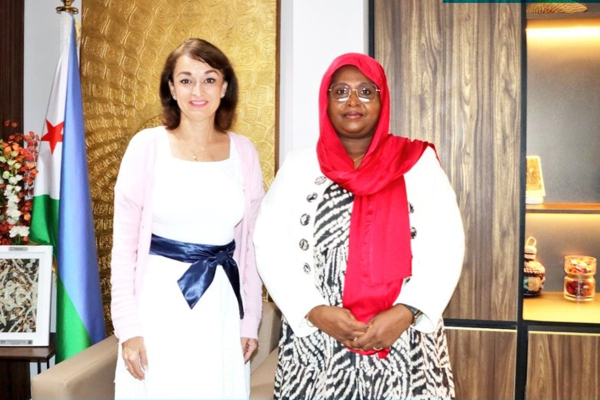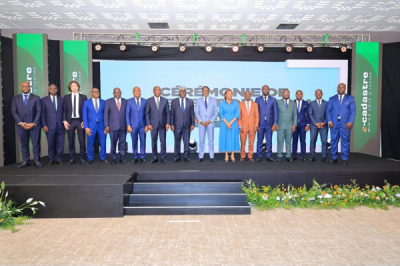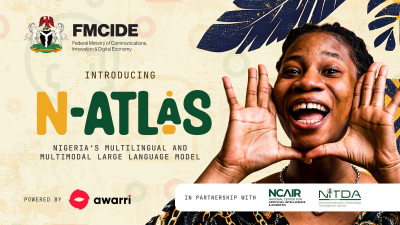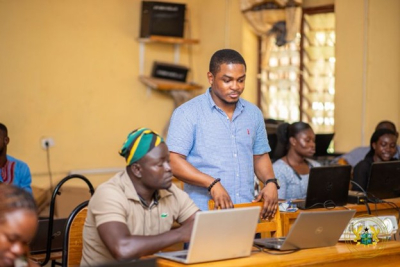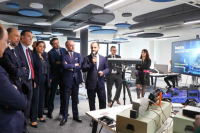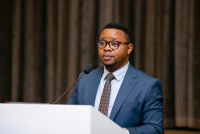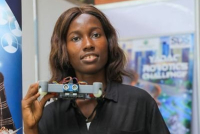• DeepLeaf, founded in 2023 by Aboulmanadel El Mahdi, wins Orange POESAM Morocco 2025 prize.
• Its AI platform detects over 1,000 plant diseases, pests and deficiencies across 80 crops.
• Startup offers mobile app, drones and API tools to support precision agriculture.
Moroccan entrepreneur and AI specialist Aboulmanadel El Mahdi, founder and CEO of DeepLeaf, has won the first prize of the Orange Social Venture Prize Africa & Middle East (POESAM) Morocco 2025. His startup develops agricultural technology solutions using artificial intelligence.
Created in 2023, DeepLeaf has built machine learning models capable of detecting plant diseases from a simple photo of a leaf or fruit. Its AI platform can identify more than 1,000 diseases, pests, and nutritional deficiencies affecting over 80 major crops.
The system has processed millions of diagnostics worldwide and keeps improving through real-time feedback loops. Its models are tailored to local conditions and updated every two months with new data from experimental sites and new partners.
DeepLeaf also provides drones for crop monitoring and a mobile app for instant detection. It has developed an application programming interface (API) for agritech platforms seeking to integrate crop diagnostics into their services.
Aboulmanadel El Mahdi graduated in computer engineering from the Polytechnic School of Agadir in 2023. That same year, he won first place in the PitchAgriHack competition. In April 2025, he also took the top prize at the GITEX Africa innovation contest.
• Djibouti and Romania discuss cooperation on digital transformation and innovation.
• Talks highlight Romania’s expertise in e-government and strong IT talent pool.
• Partnership could strengthen Djibouti’s digital governance, skills and cybersecurity.
Djibouti’s Minister of Digital Transformation, Mariam Hamadou, met last week with Olivia Toderean, Romania’s new non-resident ambassador to Djibouti, to explore a potential partnership focused on digital development and innovation.
According to the ministry, discussions centered on Romania’s expertise in digital transformation, which could open the way to promising cooperation in supporting Djibouti’s digital growth. Romania ranks 72nd globally in the UN e-government development index, with a score of 0.7636. It also boasts a strong IT talent base, ranking sixth worldwide for certified information technology specialists per capita, ahead of the United States and Russia.
The initiative comes as Djibouti steps up efforts to structure its digital economy. Following the adoption of a digital code in May, the country is now preparing a national artificial intelligence strategy. While Djibouti has already built strong telecom infrastructure, advancing public sector digitalization and strengthening specialized skills remain key to fostering innovation and digital inclusion.
If finalized, the partnership could help Djibouti enhance cybersecurity, accelerate digital transformation of its administration, and develop a pool of local digital talent. For Romania, it offers an opportunity to extend its expertise in East Africa and deepen bilateral ties in technology and innovation.
This funding is intended to expand broadband infrastructure, strengthen digital public platforms, and develop employment-ready digital skills across Zambia.
Zambia has secured a $120 million grant from the World Bank to scale up its public digital infrastructure, a major step toward meeting national development goals under the Science, Technology, and Innovation Policy and Vision 2030. The announcement was made by Minister of Technology and Science Felix Mutati during the launch of the ABSA Mobi Tap mobile payment app in Lusaka on September 18.
The support comes through the Digital Zambia Acceleration Project (DZAP), part of Phase II of the Inclusive Digitalization in Eastern and Southern Africa Multiphase Programmatic Approach (IDEA MPA). The $2.48 billion regional program, approved by the World Bank Board on June 27, 2024, covers Angola, the Democratic Republic of Congo, Malawi, and COMESA as the coordinating regional bloc. Zambia is the fifth country to implement the program.
During a July 2024 visit to Lusaka, World Bank Managing Director and Chief Administration Officer Wengcai Zhang pledged $100 million in IDA financing for DZAP, alongside an additional $20 million in unguaranteed commercial financing. He said the project would expand broadband and last-mile infrastructure, strengthen digital public infrastructure, and support high-impact sectors including health, education, and agriculture.
Zhang explained that DZAP would nurture employment-ready digital skills and increase access to digitally enabled services across Zambia. He noted the project is aligned with government priorities under Vision 2030 and would improve efficiency in both the public and private sectors.
Ahead of full approval, expected from the World Bank Board in March 2025, a $6 million Project Preparation Advance was signed in October 2024. This enabled the Smart Zambia Institute to begin stakeholder consultations on the project’s Environmental and Social Management Framework, drawing participation from all ten provinces.
DZAP has four core components aligned with IDEA’s pillars. These include extending backbone and regional networks, supplying last-mile connectivity, and strengthening the enabling environment. Other priorities include developing digital ID and trust services, enhancing digital government, supporting regional trade facilitation, and fostering digitalization in key sectors while nurturing employment-ready skills.
The program is expected to have far-reaching implications. Improved connectivity will reduce the urban-rural digital divide, opening access to e-government services, digital health, and online education for millions. Recent statistics highlight the need for these investments. As of early 2025, Zambia had approximately 19.9 million mobile connections, accounting for 92.1% of the population. However, internet penetration stood at only 33%, meaning roughly two-thirds of Zambians remained offline. Broadband-capable mobile access was high, but many users still lacked reliable, affordable internet.
The program will also invest in digital skills, preparing Zambian youth for jobs in fintech, agritech, and other emerging sectors. By doing so, it aims to position Zambia not only as a consumer of digital services but as a regional hub for innovation and investment.
The project aligns with Zambia’s wider push to digitize services, modernize governance, and enhance financial inclusion.
Hikmatu Bilali
-
Government unveils e-mining cadastre to digitalize permits and authorizations.
-
Mining share of GDP rose from less than 1% in 2014 to nearly 4% in 2025.
-
Platform aims to cut delays, boost transparency and attract investors.
Côte d’Ivoire has officially launched the e-mining cadastre portal, a digital platform designed to modernize the management of mining permits and authorizations. The system was inaugurated on September 22 in Abidjan by Prime Minister Robert Beugré Mambé.
“The launch of the e-mining cadastre is a decisive step for the development of our mining sector, which has recorded strong growth over the past decade,” the prime minister said, stressing the government’s push for modern and transparent governance. Between 2012 and 2025, national gold output quadrupled, while manganese production increased tenfold, underscoring the sector’s momentum.
The new system covers the full cycle of mining titles, from applications and processing to delivery, monitoring and archiving. It is powered by Landfolio and hosted on a secure cloud infrastructure. More than 200 mining administration officials have been trained to operate it. Authorities say the tool will speed up procedures, align with international standards such as EITI, and help curb illegal mining.
The launch comes as the mining sector’s contribution to GDP has climbed from less than 1% before 2014 to nearly 4% today. The government aims to reach 6% by year-end, supported by promising deposits of gold, manganese, nickel and lithium, alongside reforms to attract investors.
Officials expect the portal to improve transparency, competitiveness and revenue collection, while ensuring more responsible resource management. Mines, Petroleum and Energy Minister Mamadou Sangafowa-Coulibaly said the ambition is to make Côte d’Ivoire a benchmark in Africa for responsible management of extractive resources within the next decade.
The launch signals a wider digital shift: African governments and companies are no longer just consumers of foreign AI systems, but are beginning to shape the technology around local realities, identities, and needs.
On September 20, 2025, on the sidelines of the 80th United Nations General Assembly (UNGA80), Nigeria’s Minister of Communications, Innovation, and Digital Economy, Dr. Bosun Tijani, officially launched the Nigerian Atlas for Languages & AI at Scale (N-ATLAS). The Atlas is an open-source facility designed to map the country’s rich linguistic diversity of country with artificial intelligence (AI) and power-inclusive chat solutions.
The first version of the project, N-ATLAS v1, is a multilingual and multimodal large language model that supports Yoruba, Hausa, Igbo, and Nigerian-accented English. Built on Meta’s Llama-3 8B architecture and fine-tuned with over 400 million tokens of multilingual instruction data, it is Nigeria’s most ambitious step yet toward embedding African voices in AI development. “This is the first step in a broader journey to make Africa a contributor and leader in shaping AI’s future,” said Tijani.
The project is powered by Awarri Technologies in partnership with the National Information Technology Development Agency (NITDA) and the National Centre for Artificial Intelligence and Robotics (NCAIR). For Nigerians, the launch could transform how people interact with technology in their daily lives.
Language models like N-ATLAS make it possible to use apps, chatbots, and government services in local languages, not just English — helping millions who are more comfortable in Hausa, Igbo, or Yoruba. By making digital tools work in local tongues, the model breaks down barriers for communities left behind by the English-dominated internet.
With more than 500 native languages, Nigeria faces the risk of cultural erosion in the digital age. N-ATLAS helps preserve and digitize this linguistic heritage for future generations. Governments, schools, and businesses can deploy AI-powered platforms that communicate directly in people’s languages — from healthcare advice to education and customer support. This ensures more people can participate in the digital economy.
By investing in tools like N-ATLAS, Nigeria is positioning itself as a leader in African-led AI innovation. The model will enable researchers, entrepreneurs, and startups across the continent to develop culturally relevant AI solutions, while reducing their dependence on Western-trained systems that often fail to function effectively in African languages.
This movement is echoed across the continent, with similar initiatives gaining momentum. In South Africa, Lelapa AI’s InkubaLM supports languages such as Hausa, Swahili, Zulu, Yoruba, and Xhosa. Ethiopia’s Artificial Intelligence Institute is also advancing language technologies for Amharic, Afaan Oromo, Aff-Somali, and Tigrigna, integrating them into public services like the Smart Court system. These efforts reflect a continental awakening — one where African nations are reclaiming their linguistic space in the digital world and actively contributing to the global AI landscape.
Hikmatu Bilali
The Ministry of Communications, Digital Technology and Innovations announced on September 17 that the Training of Trainers component of the National Girls-in-ICT Program has commenced at Damongo Senior High School in the Savannah Region, Ghana. The program is equipping 100 selected teachers with hands-on knowledge of Scratch, a visual programming language that introduces beginners to the fundamentals of coding.
Through the training, teachers are learning how to develop interactive stories, animations, and games, which they will in turn pass on to 1,000 schoolgirls across the region.
The National Girls-in-ICT Program is a flagship initiative of the Ministry, implemented in partnership with local stakeholders.
-
Deloitte launched its CyberAcademy in Casablanca on September 19, 2025, to train cybersecurity professionals across Africa.
-
The academy offers over 60 certified training programs, integrating AI and aligning with international certifications.
-
The initiative supports the Deloitte Morocco Cyber Center's goal of expanding its expert team to over 450 by 2025 and leverages Morocco's Tier 1 global cybersecurity ranking.
Africa faces a significant challenge with the scarcity of specialized cybersecurity skills amid escalating cyber threats. Training represents a critical priority for building a resilient and secure digital ecosystem across the continent.
Deloitte, a global audit, consulting, and technology services firm, inaugurated its CyberAcademy in Casablanca on September 19. The academy operates under the umbrella of the Deloitte Morocco Cyber Center. This specialized cybersecurity training center targets professionals, students, recent graduates, and individuals undergoing professional retraining. Companies currently struggle to recruit qualified talent in the sector.
The CyberAcademy offers more than 60 certified training courses. These programs cover technical, organizational, regulatory, and strategic aspects of cybersecurity. Some modules already incorporate artificial intelligence, and customizable programs adapt to specific business needs. The academy leverages recognized academic partnerships and international certifications (ISC², ISACA, PECB, etc.) to ensure the quality of its curriculum.
This launch aligns with the ongoing momentum of the Deloitte Morocco Cyber Center, which first opened in February 2023. The center currently employs approximately 100 Moroccan and African engineers, with women constituting about 50% of the workforce. It aims to reach over 450 experts by 2025. Furthermore, Morocco has advanced in global cybersecurity rankings. The Global Cybersecurity Index 2024, published by the ITU, assigned Morocco a score of 97.5 out of 100, placing it among the international reference countries (Tier 1).
Deloitte intends to address a proven skills deficit with this academy. Many companies and institutions find it challenging to recruit advanced cybersecurity profiles. This difficulty stems from the proliferation of cyberattacks, digital fraud threats, and heightened regulatory requirements. The country's accelerated digital transformation also drives this need, evidenced by high internet penetration, widespread use of online services, and increasing digitization of public services.
This article was initially published in French by Samira Njoya
Adapted in English by Ange Jason Quenum
-
10mg Credit, a Nigerian fintech solution, offers instant, collateral-free credit to healthcare providers for medical supplies.
-
The platform leverages AI to assess creditworthiness, approving most applications within minutes.
-
Since its launch, 10mg Credit has financed over 6,000 healthcare providers, disbursing more than $3.4 million.
Access to financing remains a significant hurdle for small and medium-sized enterprises across Africa. In Nigeria, a nascent startup has introduced a solution specifically targeting the healthcare sector.
10mg Credit, a fintech solution developed by Nigerian startup 10mg Health, provides instant, collateral-free credit to healthcare facilities. These facilities use the credit to procure medicines and medical equipment. Christian Nwachukwu founded the startup in 2022.
The company said its AI-driven system quickly analyzes transaction histories to approve most applications within minutes, eliminating paperwork and delays, and provides flexible, transparent repayment plans to help users manage expenses without stress.
Healthcare establishments can opt for 10mg Credit when making purchases, either through its platform or via partner distributors. The approval process relies on AI technology, which evaluates applicants' creditworthiness in real-time. This system grants credit within minutes, requires no physical collateral, and offers repayment terms tailored to each facility's cash flow.
By enabling hospitals to pre-finance purchases, 10mg Credit helps reduce service interruptions and enhances the healthcare system's resilience. Since its inception, the solution claims to have financed over 6,000 healthcare providers, with a total volume exceeding $3.4 million and a loan approval rate near 60%. However, the startup faces challenges in managing repayment risk, securing data, and extending coverage to less connected areas.
Regarding data protection, the startup asserts it only collects information necessary for fair and instant decisions, "encrypting it end-to-end for maximum protection."
This article was initially published in French by Adoni Conrad Quenum
Adapted in English by Ange Jason Quenum
-
Kagame appoints Yves Iradukunda as new ICT and Innovation Minister
-
Iradukunda to drive Rwanda’s digital push, rural-urban tech equity
-
Ex-permanent secretary brings tech, policy, and leadership experience
Rwandan President Paul Kagame has appointed Yves Iradukunda as the new Minister of State for Information, Communication, and Technology (ICT) and Innovation, a move that signals a continued focus on digital transformation.
Iradukunda was named to the post in a cabinet reshuffle on Thursday, Sept. 18, succeeding Paula Ingabire, who previously served as the full minister for the strategic portfolio.
Iradukunda’s appointment caps a career marked by a strong involvement in modernizing government and promoting digital entrepreneurship. As the former Permanent Secretary in the Ministry of ICT and Innovation, he oversaw strategic projects to strengthen the country's connectivity, develop digital skills, and foster local technology solutions.
Before entering public service, he distinguished himself in the development and philanthropic sectors. He served as the country director for Allan & Gill Gray Philanthropy in Rwanda and as the global operations director at MASS Design Group, an international social design and engineering organization.
Iradukunda holds a bachelor's degree in mathematics and computer science from Oklahoma Christian University and an MBA from the African Leadership University School of Business. He also holds a diploma in public service innovation from the Cambridge Judge Business School. This academic background, combined with his field experience, underpins his vision of inclusive digital technology serving development.
A long-time advocate for youth training and mentorship, he is also the co-founder and former leader of Emerging Leaders and Entrepreneurs of Rwanda, an organization that promotes leadership and entrepreneurship.
His appointment comes as Kigali seeks to accelerate its digital transition and solidify its status as a regional technology hub. The new minister will play a key role in speeding up ongoing projects to close the digital divide between urban and rural areas, stimulate local innovation and startup growth, and strengthen cybersecurity and digital sovereignty. His mandate also includes helping to develop the skills of young people to meet the growing demand for talent in the sector.
Following his appointment, Iradukunda said he was "fully committed to giving my all to shape a better future for Rwandans through transformative technologies."
Samira Njoya
With expertise in electronics and innovation management, she has focused her career on robotics. She develops initiatives that combine education, research, and social engagement.
Yapi Danila Christiana, an Ivorian mathematician and roboticist, has focused her career on robotics, developing initiatives that combine education, research, and social engagement.
With expertise in electronics and innovation management, she founded YADAC Robotics in 2023. The organization trains young people and professionals in robotics and STEAM (Science, Technology, Engineering, Arts, and Mathematics). YADAC Robotics also hosts webinars and workshops to make robotics more accessible and to integrate it into Côte d’Ivoire's educational system and daily life.
Her most notable initiative is the Yadac Robotics Challenge, an annual national competition that brings together students and robotics enthusiasts. The second edition, held in July 2025 at Félix Houphouët-Boigny University in Abidjan, challenged teams to present solutions on the theme "Robotics and Climate: Reducing Carbon Emissions Through Technological Innovation." Her work earned her the Jury Prize at the Orange Social Entrepreneur Prize in Africa and the Middle East (POESAM).
In addition, Yapi is the Côte d’Ivoire representative for Experiential Robotics, an international platform. She is also the national organizer for the Robotics for Good Youth Challenge, an initiative of the International Telecommunication Union. She also mentors the national team for the FIRST Global international robotics competition and serves as a consultant for robotics-related educational programs at the U.S. Embassy in Côte d’Ivoire.
After graduating with a degree in mathematics from Nangui Abrogoua University, Yapi worked as an IT assistant for MAXHUB AFRICA, a company specializing in collaboration solutions, from 2019 to 2021. In 2021, she was recognized at the fourth edition of a robotics competition organized by the U.S. Embassy in Côte d’Ivoire.
Melchior Koba
More...
He has built a career bridging finance and entrepreneurship, with initiatives ranging from sustainable infrastructure investments to developing crowdfunding solutions in Africa.
Batiana Ismaail Franck Nacro is a Burkinabé economist and entrepreneur. He is the co-founder and CEO of Terra Invest Africa, a private equity firm he established in 2018. Through his company, he focuses on investing in, financing, and supporting projects with significant economic, social, and environmental impact across the continent, with a particular emphasis on sustainable and eco-friendly infrastructure.
His recent work on the crowdfunding platform Terra Biga was recognized on September 10, when he was awarded second place at the national phase of the Orange Social Entrepreneur Prize 2025 (POESAM 2025) in Burkina Faso. Launched by Terra Invest Africa in 2022, Terra Biga connects NGOs, private citizens, and the African diaspora with social projects. The platform features a mapping tool for initiatives and uses artificial intelligence to enhance the coordination and monitoring of funds. Terra Biga offers various participation models, including donations, equity investments, and venture capital, allowing project leaders to select the financing method that best suits their needs while enabling investors to diversify their commitments.
In addition to his work with Terra Invest Africa, Nacro is an associate at the Rosette Nacro Audit & Consulting firm, which specializes in accounting. He is also a co-founder of the nonprofit Natahnaël-Laël school, founded in 2012. The school provides education to children in Talarghin, a community in Burkina Faso that lacks running water and electricity.
Nacro graduated from the University of Montpellier in 2018 with a master's degree in economics. Following summer internships at Bank of Africa and UBA Group, he joined the Interbank Guarantee Financial Company of Burkina Faso (SOFIGIB) as a financial research analyst in 2018. From 2019 to 2020, he worked as a financial analyst for MotorK, an automotive technology company based in London.
Melchior Koba
- Zambia drafts new bills on e-communications and postal services
- Reforms align laws with cybersecurity, e-commerce, and digital growth
- Part of 2023–2027 strategy to boost trust, investment, innovation
Zambia is updating its legal framework to keep pace with the growth of digital services. At its seventeenth meeting on Monday, the Cabinet approved two bills for introduction to Parliament concerning electronic communications and postal services.
The first bill amends the Electronic Communications and Transactions Act, which was enacted in 2021 to establish the legal foundation for e-commerce, digital payments, and other electronic services. According to Information and Media Minister Cornelius Mweetwa, the revision aims to correct inconsistencies with the Cybersecurity Act, scheduled for 2025, and to strengthen the regulation of public key infrastructures, which are essential for secure transactions.
"The Act aims to promote a secure and trustworthy online environment, protecting consumers and businesses alike. The amendment will enhance secure, efficient and reliable electronic transactions while stimulating economic growth," Mweetwa said. The minister noted, however, that the current law has posed challenges, particularly in the licensing process and its integration with critical infrastructure.
The second bill will replace the Postal Act, which has been in force since 2009 and is considered outdated given technological advancements and new challenges like cybercrime and counterfeiting. It seeks to adapt the legal framework to changes in the postal and courier markets, which have been heavily impacted by the rise of e-commerce.
These reforms are part of the National Digital Transformation Strategy (2023-2027), which aims to modernize the Zambian economy through digital technology and create a climate of trust for businesses and consumers.
Ultimately, these bills are expected to enhance the security and competitiveness of Zambia's digital environment, increase investor confidence, and accelerate the adoption of digital services. They will also support economic diversification by fostering innovation and the emergence of new digital business models.
Samira Njoya
In Togo, informal savings circles, known as tontines, are moving into a more secure digital space thanks to fintech companies like Ollo Africa. The company recently received an electronic money institution license from the Central Bank of West African States (BCEAO).
Ohana Africa is a financial technology solution developed by the Togolese startup Ollo Africa. Its mobile application allows users to organize and manage traditional savings circles, known as tontines, online. The solution was launched in August 2024 by Mawuna Koutonin, the company's CEO.
The app is available on both iOS and Android, where it has already been downloaded more than 5,000 times, according to data from the Play Store. Users can create an account and a digital space to start a savings group, define contribution rules, track payments, and plan the distribution of funds. Every transaction is traceable, which reduces the risk of misunderstandings.
The system also includes automated reminders and notifications to help enforce group discipline. It addresses the issues of reliability and fund security often associated with traditional tontines, helping to reduce disputes and strengthen trust among participants.
Beyond group management, the application provides people with limited access to banking services with a structured savings solution and opens up opportunities for future integration with other digital financial services. It is designed to be a practical, user-friendly tool aligned with local realities.
The app's launch is part of a growing trend in African fintech, where mobile applications are transforming traditional economic practices into modern digital solutions. In addition to Togo, Ohana Africa is also available in Nigeria and Kenya.
Adoni Conrad Quenum
- Mozambique launches ThinkLab incubator to support digital startups
- Twelve firms in health, AI, transport, finance join first cycle
- Part of broader strategy for inclusive digital transformation by 2030
Mozambique's communications regulatory authority, INCM, has launched the ThinkLab, a new incubator designed to support local startups and entrepreneurs in the digital sector. The launch took place in Maputo and was attended by Communications and Digital Transformation Minister Américo Muchanga.
"A nation without innovation is a nation of dormant minds. ThinkLab is a laboratory for projecting digital solutions for the most urgent national challenges. It is also a collaborative platform where the private sector, academia, and the government plan and project the future we want, together," Muchanga said.
Twelve startups were selected for the first incubation cycle. They operate in various sectors, including health, transport, finance, IT, and AI. Through ThinkLab, the regulator aims to provide them with technical and regulatory support, resources, training, and mentorship. The initiative also facilitates connections with experts and investors. The goal is to ensure project viability, encourage access to funding, and build a collaborative ecosystem that brings together startups, businesses, universities, and regulators.
The INCM hopes the project will help drive digital transformation, a key priority for Mozambican authorities. To that end, the government launched the "Internet For All" initiative last March to democratize internet access by 2030. This effort is seen as "a fundamental pillar of the government's overall digital transformation strategy, creating an inclusive digital environment that will enable citizens, businesses, and public institutions to interact and innovate, thus contributing to the emergence of an accessible and inclusive digital economy."
According to pan-African investment firm Renew Capital, Mozambique's startup ecosystem is still in its early stages. However, the firm notes that the country's vast natural gas reserves, abundant mineral resources, and strategic geographical location make it a promising market to watch in Africa. The challenges mentioned include a regulatory framework still under development, inadequate infrastructure—particularly in internet connectivity—and a significant skills gap in technology professions.
Isaac K. Kassouwi



